Will Bankruptcy Stop a Garnishment? Here’s What You Need to Know
Will Bankruptcy Stop a Garnishment? Here’s What You Need to Know?
Are you facing wage garnishment and wondering, will bankruptcy stop a garnishment? Filing for bankruptcy can indeed halt most garnishments right away thanks to an automatic stay. In this article, we’ll examine how bankruptcy impacts wage garnishment, highlight the types of debts it can’t stop, and provide steps to navigate this process for financial relief.
Key Takeaways
- Bankruptcy triggers an automatic stay that halts most wage garnishments, providing immediate relief for individuals struggling with debt.
- Certain debts, such as child support and recent tax obligations, are exceptions and may continue post-bankruptcy, requiring separate management.
- Consulting a bankruptcy lawyer is essential for effectively navigating the process of stopping wage garnishment and understanding one’s rights and options.
Understanding Wage Garnishment
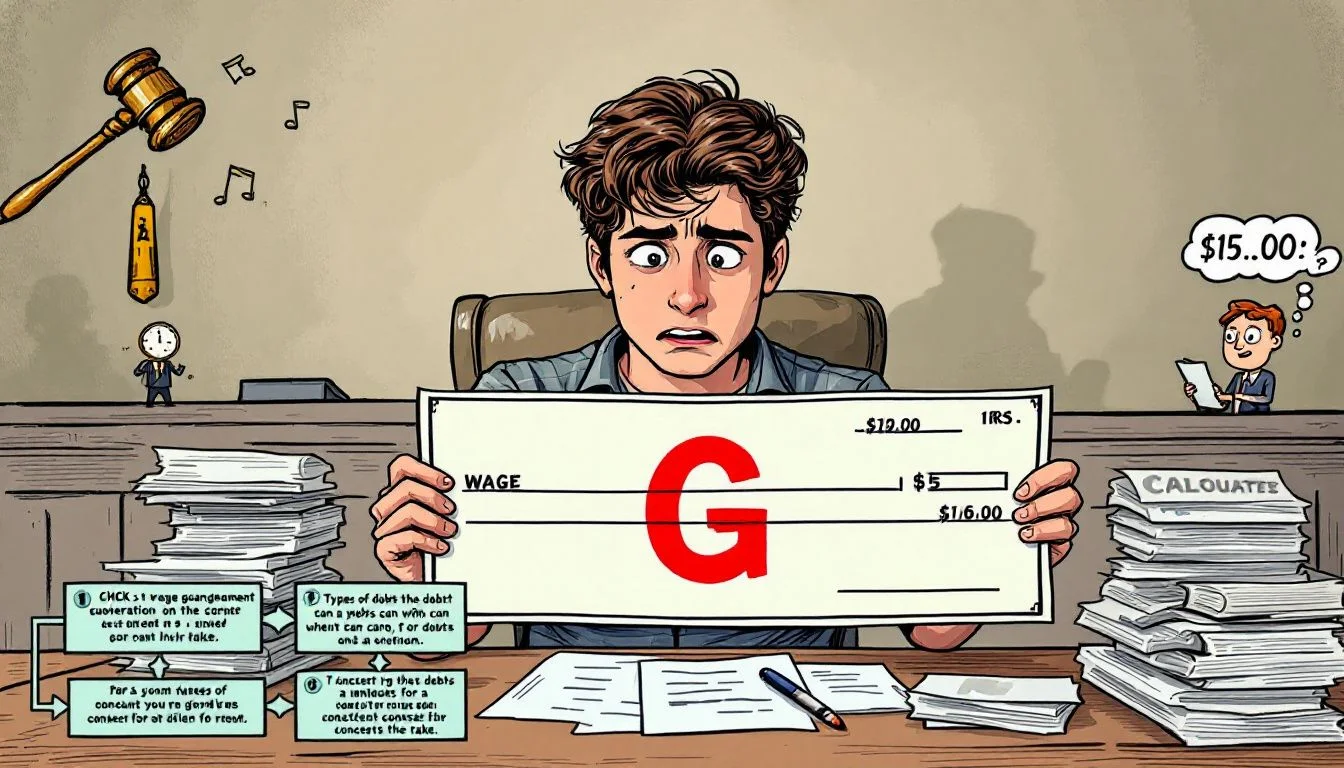
Wage garnishment compels your employer to withhold part of your earnings to settle a debt, essentially allowing creditors to collect directly from your paycheck before you can use your income for other expenses.
Typically, about 25% of your take-home pay can be deducted through wage garnishment, depending on the type of debt. This deduction can make it incredibly challenging to cover your regular living expenses, adding financial strain and stress to your daily life. Fortunately, Title III of the Consumer Credit Protection Act offers some protection, ensuring you can’t be fired solely because your wages are garnished for a single debt.
Federal regulations limit the weekly amount that can be garnished, protecting part of your income. While wages, salaries, bonuses, and retirement income are subject to garnishment, tips are usually exempt. Knowing these details helps you understand how wage garnishment affects your finances.
How Bankruptcy Affects Wage Garnishment
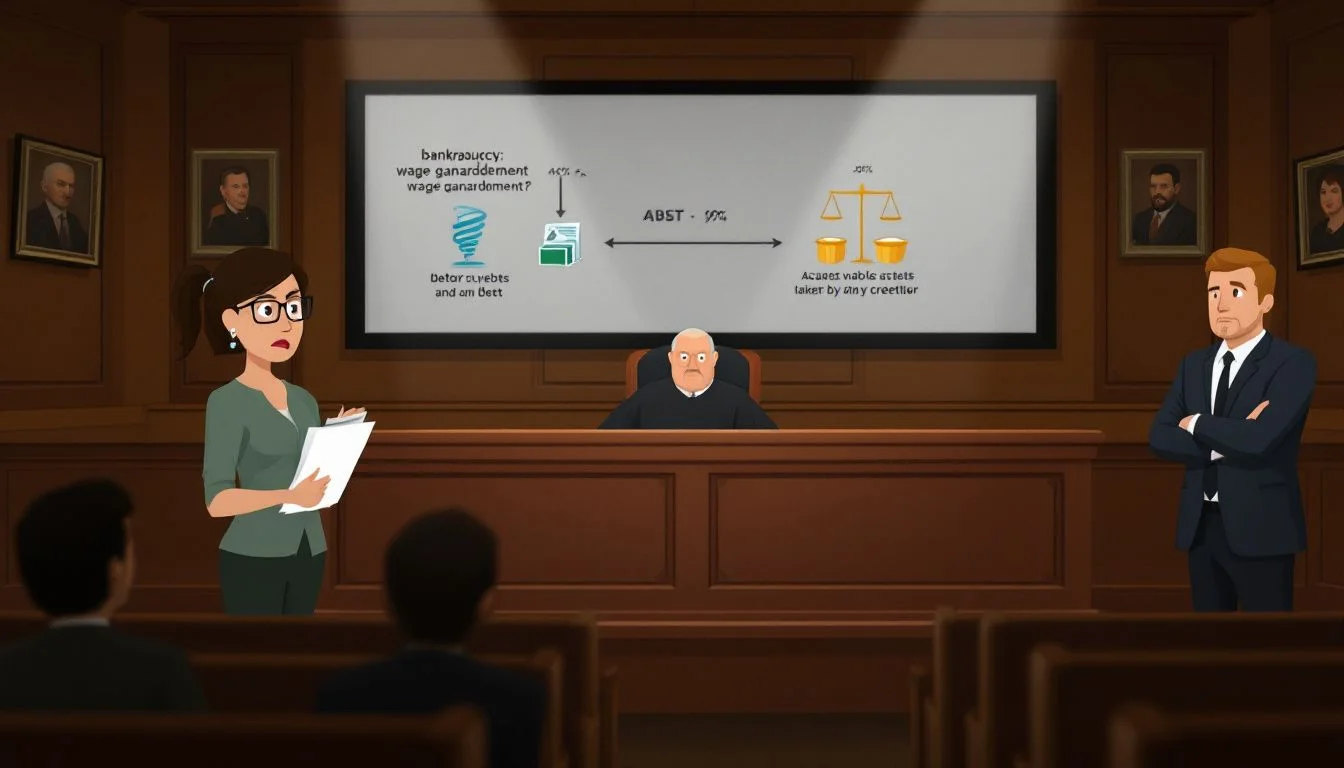
Bankruptcy effectively halts wage garnishment by triggering an automatic stay, which immediately stops most garnishments and provides you with breathing room to manage your debts without continuous paycheck deductions. Bankruptcy stop wage garnishment.
Both Chapter 7 and Chapter 13 bankruptcies can stop wage garnishments, though they do so in different ways. Chapter 7 offers a quicker, more straightforward path to eliminating unsecured debts, while Chapter 13 involves creating a repayment plan approved by the bankruptcy court. Regardless of the chapter you choose, bankruptcy provides temporary relief from wage garnishment, allowing you to focus on reorganizing and managing your financial obligations.
However, not all debts are treated equally in bankruptcy. For instance, some private student loans might only be temporarily halted and could resume later if not fully addressed. Recognizing these distinctions helps you decide if bankruptcy is the right solution for your wage garnishment issues.
Types of Garnishments Not Halted by Bankruptcy
Bankruptcy can stop many wage garnishments, but there are exceptions like child support and alimony, which continue despite bankruptcy and require family court modifications. These garnishments persist unless you take additional legal steps.
Recent tax debts are generally not dischargeable in bankruptcy. Bankruptcy may temporarily halt payment plans for these debts but doesn’t eliminate the obligation. You’ll need to address these separately while seeking relief from other financial burdens.
Knowing these exceptions is crucial when considering bankruptcy for wage garnishment. Awareness of persistent debts despite bankruptcy helps you develop a comprehensive plan to manage your financial obligations.
Steps to Stop Wage Garnishment Through Bankruptcy
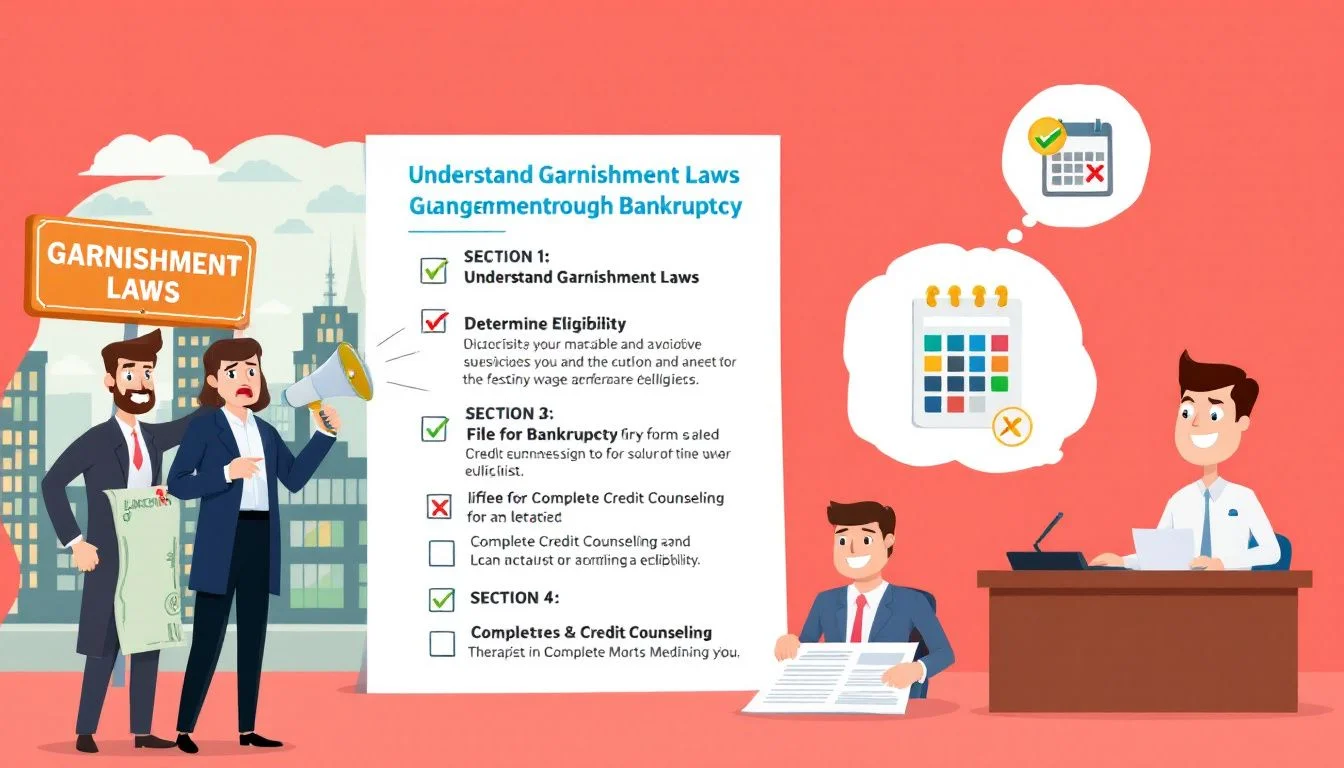
Stopping wage garnishment via bankruptcy involves determining your eligibility, proceeding with filing, and benefiting from the automatic stay activation.
Carefully following these steps ensures you effectively halt wage garnishment and resume wage garnishment regain financial control.
Determine Eligibility for Bankruptcy
The initial step to halt wage garnishment via bankruptcy is determining your eligibility. Chapter 7 and Chapter 13 are common options. Assessing which chapter suits your situation is vital, as each has specific eligibility requirements.
Filing for Bankruptcy
After determining eligibility, the next step is filing for bankruptcy, which involves preparing documents, paying fees, and submitting paperwork to the bankruptcy court. An accurate list of your debts and income is required.
A bankruptcy lawyer can simplify this process, ensuring all information is correctly provided and deadlines are met. They can guide you through legal intricacies, helping you avoid delays or complications.
Automatic Stay Activation
The automatic stay, a powerful bankruptcy tool, immediately halts most creditor actions, including wage garnishments, once you file. Your employer must stop garnishing wages upon receiving notice of your bankruptcy.
If a creditor continues garnishing wages after being notified, they violate the automatic stay, which can be addressed legally. This protection offers immediate relief, enabling you to focus on debt resolution without financial strain.
Informing Your Employer
Promptly informing your employer about your bankruptcy filing ensures wage garnishment stops quickly. Employers must legally cease garnishment upon receiving notice. Provide your employer with the bankruptcy case number and court details to expedite the process.
Although sharing this information with your employer may feel uncomfortable, it’s necessary to ensure compliance with the automatic stay. Clear communication helps prevent delays, enabling you to retain more of your earnings immediately.
Recovering Wages Garnished Before Filing
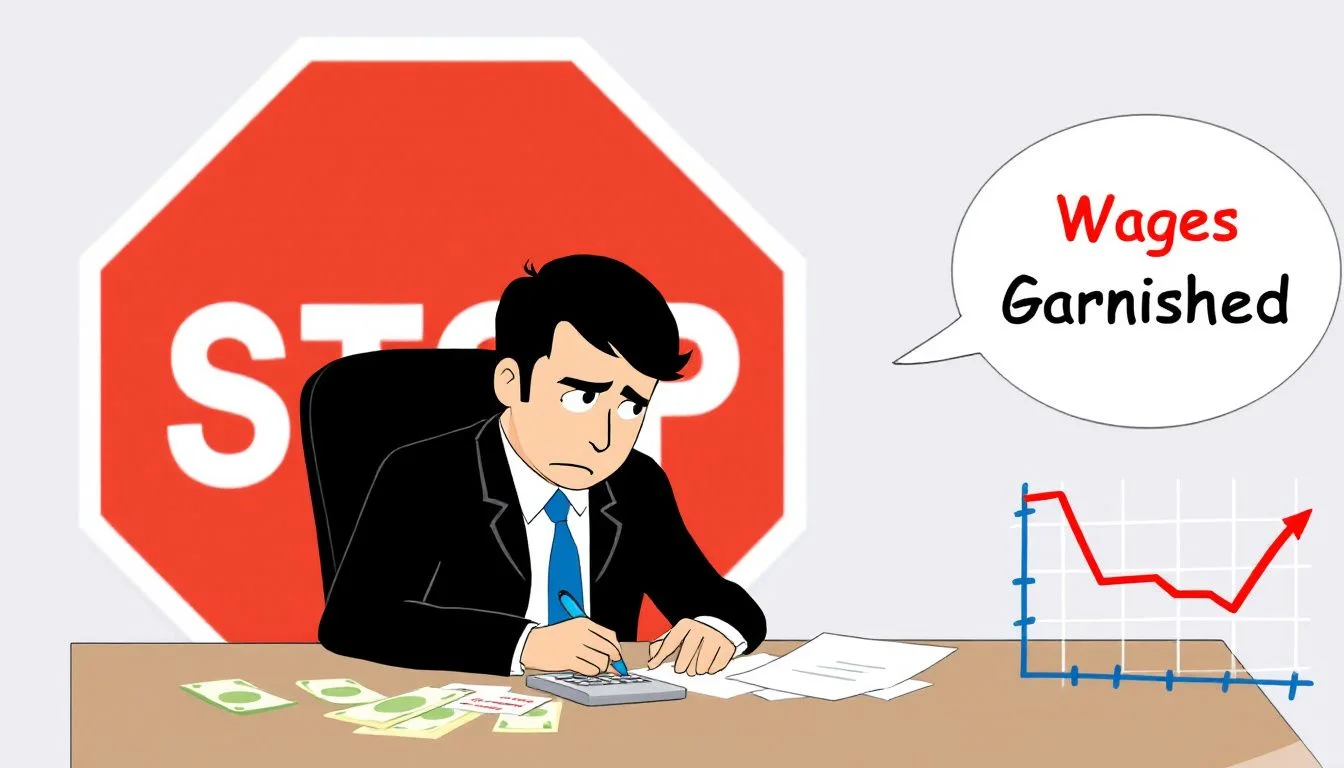
Recovering wages garnished before filing for bankruptcy is possible under certain conditions. If garnished within 90 days before filing and the total exceeds $600, you might recover these funds as a “preference”. State exemptions can impact this ability.
Deciding to pursue recovery depends on the potential amount versus legal costs. Consulting a bankruptcy lawyer helps weigh these factors and determine if pursuing recovery is right for your situation.
Post-Bankruptcy Wage Garnishment
After filing for bankruptcy, the automatic stay halts wage garnishments. For dischargeable debts like credit card balances and medical bills, garnishment stops permanently after completing Chapter 7. In Chapter 13, it stops due to the court-approved repayment plan.
Non-dischargeable debts, like child support and certain tax debts, can resume garnishments post-bankruptcy if unpaid. Notify your employer if they continue garnishing wages and consider legal action.
If the bankruptcy court dismisses your case without a discharge, creditors can resume garnishments and other collections for all debt types. Understanding these outcomes helps you prepare and respond to post-bankruptcy garnishment issues.
Alternatives to Bankruptcy for Stopping Wage Garnishment
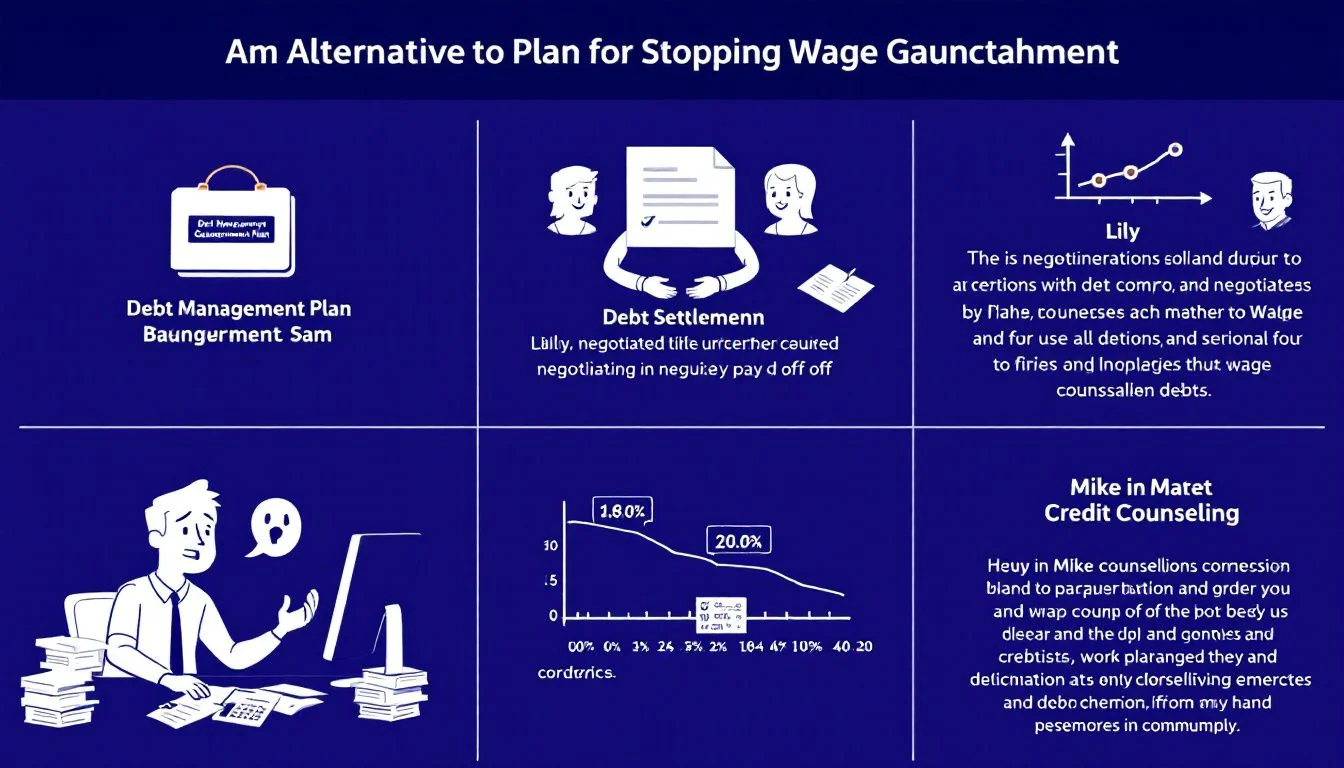
While bankruptcy can stop wage garnishment, it may not suit everyone. Alternatives include negotiating with creditors, claiming exemptions, and enrolling in debt repayment programs.
These options offer relief without the long-term implications of bankruptcy.
Negotiating with Creditors
Negotiating with creditors can effectively stop wage garnishment without filing for bankruptcy. Discussing a lump-sum settlement or payment plan can work for both parties. If feasible, paying off the debt in full is the most straightforward solution.
Creditors might agree to a hardship program, allowing lower monthly payments if garnishment causes financial difficulties. Be cautious with debt settlement companies, as they often charge high fees.
Claiming Exemptions in Florida
Florida law allows you to claim exemptions to protect your income from garnishment, detailed in Florida statute 222.11 and other relevant laws.
Filing for these exemptions can reduce or eliminate garnishments due to financial hardship.
Debt Repayment Programs
Debt repayment programs, like debt management programs (DMPs), consolidate debts into a single monthly payment. Often administered by credit counseling agencies, these programs negotiate more manageable payment plans to prevent wage garnishment.
Consult a Bankruptcy Lawyer
Consulting a bankruptcy lawyer is crucial for understanding the implications of filing on wage garnishments. A knowledgeable attorney helps explore options and determine the best course of action.
Lawyers can guide you on whether immediate action is needed to stop garnishments before filing a court order. Finding a qualified bankruptcy lawyer significantly aids in navigating this complex process and achieving the best outcome.
Summary
In summary, wage garnishment can severely impact your financial stability, but filing for bankruptcy offers a viable solution to halt these deductions. Understanding the types of garnishments affected, the steps to stop them, and the alternatives available is crucial for making informed decisions.
If you are facing wage garnishment, consider consulting a bankruptcy lawyer to explore your options and take the necessary steps to protect your financial future. With the right approach, you can regain control of your finances and move forward with confidence.
Frequently Asked Questions
What is wage garnishment?
Wage garnishment is a legal mechanism allowing creditors to automatically deduct funds from your paycheck to satisfy outstanding debts. It is important to understand this process, as it can significantly affect your finances.
How does bankruptcy stop wage garnishment?
Filing for bankruptcy triggers an automatic stay that immediately stops most wage garnishments, offering you a crucial pause to manage your financial situation. This legal protection helps you regain control over your earnings during the bankruptcy process.
Are there any types of debts that bankruptcy cannot stop from being garnished?
Yes, bankruptcy cannot stop the garnishment of debts like child support, alimony, and certain recent tax obligations. These responsibilities remain enforceable regardless of bankruptcy status.
Can I recover wages that were garnished before I filed for bankruptcy?
Yes, you can recover wages garnished within the 90 days prior to filing for bankruptcy if the total exceeds $600 and you have applicable exemptions.
What are some alternatives to bankruptcy for stopping wage garnishment?
You can effectively stop wage garnishment by negotiating with creditors, claiming exemptions due to financial hardship, or enrolling in debt repayment programs. These options can provide a viable path to managing your debts without resorting to bankruptcy.

